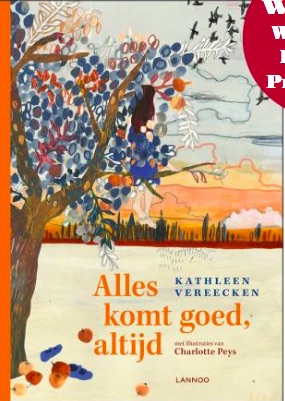
- 一切都会没事的
- Alles komt goed, altijd (Everything Will Be Fine, Always)
- 作者:Kathleen Vereecken,插图:Charlotte Peys
- 出版社代理人:Lannoo(比利时)
- 出版时间:2018年9月
- 页数:172页包括插图
- 已售版权:
- 版权联系人:tina@peonyliteraryagency.com
内容介绍
*本书获得2019年Woutertje Pieterse Prize
*本书有英语样章
获奖作者Kathrleen Vereecken的新书,关于在第一次世界大战的一名小女孩如何亲身目睹自己的家庭被战争摧毁。她被逼一夜长大,看见她从小认为美好的世界突然被战争占领。故事的主人公是Alice,一位10岁小女孩。她的家庭住在Ypres,他們一开始并不担心战争,认为不会打到Ypres。但是,跟着时间,战阵越来越接近,于是父亲决定全家逃到隔壁的小镇Menen。当隔壁的屋子突然烧起火,父亲还是决定自己家里最安全。回到家的一家人却发现所有事情都不一样了,家已经没有家的感觉。外面的街道已经被摧毁,其他的房子都被攻击。
一天,母亲出去买面包,最后没有回家,于是姐姐Rosa开始担任母亲的角色照顾家庭。到这个地步,父亲还是拒绝逃离,一家人开始住在地下室。再一次次被攻击后,他們被带到收留所,Alice被告知她必须带着弟弟妹妹逃到法国才有机会存活。父亲、哥哥以及姐姐会再去找他们。故事的最后是一年后的Alice,她已经长大了,虽然她才11岁,但是她所见识过的世面已经让她的灵魂苍老许多。
好评:
https://www.boekenbijlage.nl/aangrijpend-historisch-verhaal/
Vereecken doesn’t need bombastic language to captivate and affect the reader. The further she takes you along in the story, the more she grabs a hold of you. The family has to increasingly deal with hunger and danger, and eventually with drastic, personal loss. When one day, Alice gets the responsibility to flee to France with her younger brother and sister (during that escape, she turns eleven), she has to leave behind the innocent child she once was for good and she gets to know her strength and persistence as a young teenager. Even though Vereecken describes a raw reality that you can’t escape, she does it with an accessible, pure language that doesn’t get heavy at any time. She takes enough breathers in the form of beautiful reflections or whimsical scenes. She lets a man tell jokes in an underground shelter to distract the kids (and probably himself as well). These kind of intermezzos really work.
http://mappalibri.be/?navigatieid=62&recensieid=7706
Everything will be fine, always is a book of contradictions. Poetic, delicate wordings, that create moments of beauty are in contrast with descriptions of war scenes, often in a more explicit language. The (initially) colourful imagination and recklessness of the children contrast with the harsh reality of war. Vereecken and Peys bring these contradiction beautifully together in a powerful youth novel, which intrinsically, stylistically, and visually knows how to persuade.
http://www.lees-wijzer.be/begeleider/boek/alles-komt-goed-altijd
What makes this story so captivating is the precise, sober, and serene word choice, thus avoiding every form of sentimentality or sensation. Vereecken’s sentences are so clear that you discover exciting depths under their surfaces every time. She confronts you with the essential difference between just doing and just being. The war doesn’t just ‘come’ closer, it ‘crawled’ closer. Alice’s thoughts after her sister’s death were so touching in their simplicity. When she sees her father and brother again, it was strikingly written: ‘We were as together as we could be’.
The illustrations by Charlotte Peys seamlessly match the supressed emotionality of the text. They also evoke more than what’s drawn. She draws people as shadows in different tints of blue. As you can’t see the faces in detail, it’s mainly the postures that express those feelings, which gives the figures an expressivity that reminds us of images by Kollwitz.
https://pluizuit.be/boek/alles-komt-goed-altijd/
Not only Alice’s growth, but the events and the sadness are also very intensely and powerfully described by Vereecken. She elevates the language usage to art. Her sentences fit, they say what has to be said and she does that on a high literary level. The characters are partly shaped by what is hidden in those words. The illustrations by Peys are also not simple. Her style and use of colour are, which perfectly suits the initial simplicity of the family life. But the content of the illustrations says a lot. Peys chooses for faceless silhouettes. During the war, the individual is lost and only a mass is left. The illustrations painfully show this truth. This recommendation tells a story that is beautiful, intensely sad, hopeful, and powerful and does that in an unforgettable manner.
Gazet van Antwerpen
The commemoration of 100 years Armistice Day provoked several historians to start writing reference works. In the fiction corner, it stayed relatively calm, although Kathleen Vereecken delivers a special contribution to war literature with her youth novel. In Everything will be fine, always, we follow the eleven-year-old Alice, who grows up in the Westhoek (the “west corner” of Belgium). Through her eyes we see the threat of an impending war by passing refugees or the advancing German army.
De Standaard
Although the war is described from a child’s point of view, the atrocities aren’t shunned. Short chapters with a concise text constantly work towards a sharp point. Vereecken doesn’t overdo the fears and emotions, which is why Alice’s story is all the more compelling. In one of the most captivating chapters, Alice suddenly lets her tears run free. Furthermore, her brave brother Oscar is also crying. They have already lost a lot at that point and it’s almost a relieve that they have to cry so hard. But the reader has been misled: not their emotions, but poison gas has caused the intense reaction. The kids are able to run inside just on time, but the scene ends with a horrifying image: the next morning, all the blackbirds are dead under the apple tree. That was almost their fate.
关于作者:
Kathleen Vereecken是De Standaard 的自由工作记者。她是一位全职作者以及编剧。她的小说I Think it was Love在2010年获得Boekenleew奖。
Charlotte Peys是一位插画家。


